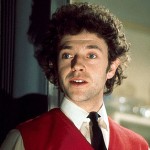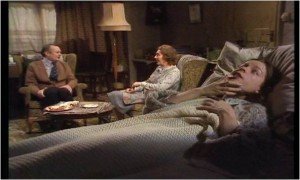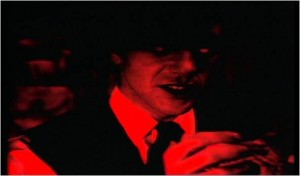by CAT McKIERNAN
Play for Today Writer: Dennis Potter; Director: Barry Davis; Producer: Kenith Trodd
‘Why can’t people accept evil when they are offered it?’
Brimstone & Treacle is probably one of Dennis Potter’s most well-known titles, not least because of the ban it received directly before its originally scheduled transmission date of 6 April 1976. It took a full eleven years, with different BBC executives, before the play was finally broadcast for the first time.
Written as part of an informal trilogy, Brimstone & Treacle was intended to be viewed alongside two other Potter plays that also challenged aspects of spirituality and explored conventional ways of thinking, Double Dare and Where Adam Stood. Instead, as John R. Cook notes in his book, ‘having been commissioned and recorded by the BBC it was “pulled” from the schedules on the orders of Alasdair Milne, then Director of TV Programmes within the Corporation’1.
Brimstone & Treacle is known as one of Potter’s visitation dramas, wherein a stranger appears at the front door and irrevocably changes the lives of those within. Those within, in this particular play, are Mr Bates (Denholm Elliott) and Mrs Bates (Patricia Lawrence), a middle-aged suburban couple and their daughter Pattie (Michelle Newell), who was left severely disabled having been hit by a car two years previously. Their different attitudes to Pattie’s condition have divided the couple and they live out a drab existence of bitterness and despair focused entirely on their daughter, who lies on a bed in the lounge – gibbering and drooling, a constant reminder of what they have lost. This is intercut with a number of flashbacks slowly revealing what happened on the night of Pattie’s accident.
Mrs Bates prays for a miracle and firmly believes that Pattie can understand what is going on around her. She holds on to the hope that, as suggested by their doctor, it may be the trauma of the accident causing her state rather than the accident itself, and that at some point she will be restored to her former self. Mr Bates, however, strongly disagrees with this theory and is vehemently of the opinion that their daughter is lost to them forever, and God and miracles do not exist.
Enter the devil, in the guise of Martin Taylor (Michael Kitchen), an outwardly respectable, well-mannered, clean and considerate young man who pretends to have known, and held an unrequited love for, Pattie before the accident. He first accosts Mr Bates in the street and, pretending to know him, cleverly fishes for the information he needs to be able to insinuate his way into their lives. As Martin feints collapse at the news of Pattie’s condition, Mr Bates abandons him on the pretence of fetching his car. Later that night Martin shows up at their door with Mr Bates’s wallet – devoid of cash – which he assures them must have fallen from Mr Bates’s pocket during Martin’s collapse. Mr Bates is extremely suspicious of Martin believing him to have taken the cash, although Mr Bates warms to him immediately and assures him that her husband has always had a problem with Pattie’s friends – she remembers a friend called Susan who came from a poor background and whom he believed not good enough to be with his daughter.
Preying on Mrs Bates’s good nature, Martin persuades the couple to allow him to stay with them to be close to his ‘dearly beloved’ Pattie, looking after her and affording Mrs Bates some much-needed respite. His true intention is revealed later on, however, when installed in Pattie’s old bedroom for the night, the devil in him surfaces – complete with red colour filter over the scene – as he fondles her underwear and fantasizes about having sex with her. As Mrs Bates heads off to the hairdressers the following day, leaving Pattie alone with Martin, he takes the opportunity to rape her.
It is this scene which is most cited as earning Brimstone & Treacle its ban. It was pulled from the schedules at the last minute, and what concerned Potter the most was the lack of communication with which this was done. In an interview on The South Bank Show from February 1979, Potter stated:
I think it behoves the people who make the decisions to think very clearly about the effect these things have on an audience, and I would wish to enter into a discussion about this… If (art) is significant, what significance does it have? And TV executives above all people ought to have worked it out, so there should be a discussion.2
Potter also quoted Alasdair Milne’s statement that ‘I found the play brilliantly written and made, but nauseating… I believe that it is right in certain instances to outrage the viewers in order to get over a point of serious importance but I am afraid that in this case real outrage would be widely felt and that no such point would get across’3. The BBC, however, stopped short of using the word ‘banned’, preferring instead to use the term ‘un-transmitted’ in that week’s Radio Times in a profile of Dennis Potter incongruously entitled ‘Dennis Potter: The Values of a Television Playwright’4.
On her return from the hairdressers, Mrs Bates believes she can see a light in her daughter’s eyes which was previously not there. She is happy in the knowledge that Martin is clearly doing something good for their daughter by his presence and asks him to pray for Pattie with her. Martin accepts the challenge and sets about the task with evangelical zeal, using his powers to dim lights, change the atmosphere and light candles before offering a tongue-in-cheek prayer to the heavens.
Later that evening, having previously made known that he has joined the National Front, Mr Bates reveals his bigotry to Martin by saying that he believes all migrant workers and immigrants should be sent back home – a point to which Martin warms, protracting the argument to its most radical conclusion by suggesting the use of detention camps and rail trucks in which to ship people. Faced with this extreme vision Mr Bates is appalled by his own reactionary values, and recoils, saying that he only wants things to be the way they were – two years ago. He is so shocked by the possible depths of his own intolerance that he decides not to renew his membership of the NF.
During the night, when the house is in darkness, Martin sneaks downstairs and attempts to rape Pattie again: only this time she screams, alerting her parents. Martin runs off into the night (in the final scene we see Martin bumping into another stranger, pretending to know him), leaving Mr and Mrs Bates to discover that their daughter has been cured of her condition as she asks, ‘What happened, Daddy?’ The final flashback reveals Mr Bates in bed with Pattie’s friend Susan. Horrified, Pattie ran from the flat and directly into the path of an oncoming car.
As Glen Creeber noted,
Potter argued that this plot, controversial on the surface, was simply an inversion of his previous visitation dramas, suggesting that if the ‘neat, polite and unctuous young man had been “an angel”, the play would not have met with so much trouble’. As it is, Martin is clearly the agent of much darker forces’5.
Whilst it is clear that Martin does represent dark forces, it is also clear that when visited upon the Bates household, these dark forces bring about changes for the better, seeing Pattie cured of her condition at the end of the play. Does the end, however, justify the means? Why would the rape of a defenceless and disabled young girl bring about such a restoration? Are we to read that in every evil there is some good? Certainly, Brimstone & Treacle opens with a quote from Kierkegaard: ‘There resides infinitely more good in the demonic than in the trivial man.’ If we are to understand, therefore, that Martin represents the demonic and Mr Bates the trivial, this is telling us, then, that Martin is infinitely more good than Mr Bates. It is only at the end of the drama, when the final flashback is revealed in full showing Mr Bates in bed with Susan, Pattie’s friend, that we understand he is the cause of his daughter running into the road and having the accident. Throughout the play, Mr Bates is very embarrassed and intolerant of his daughter’s condition and would prefer to think of her as gone forever. Perhaps his attitude is more indicative of his own self-loathing and guilt which he then projects onto Pattie. Pattie is thus rendered a symbol of her parents’ divided and dissatisfied marriage allowing the rape scene to be read as an allegorical attack on a stale partnership. It is only when Pattie is ‘cured’ at the end of the play that Mr Bates has to account for his infidelity.
It is almost as if Martin’s role within the play is to hold a mirror against Mr and Mrs Bates’s life in an attempt to force them to change: Devil’s Advocate, if you will, rather than devil. Certainly this metaphor is used in the play: the camera settles on a reflection of a Mick Jagger6 wall poster in Pattie’s dressing table mirror – while That Old Black Magic plays on the soundtrack7 – and the following morning, the same mirror shows a reflection of Martin as he sits in bed and talks to Mr Bates. The idea of Devil’s Advocate is taken still further as Mr Bates reveals to Martin his bigotries and ideals only to be stunned into remorse as Martin expands these ideals towards an horrific, but natural conclusion. Mr and Mrs Bates are both, in their own and very separate ways, yearning for a time that now appears to be lost to them forever, a happier time before Pattie’s accident when life was simpler. Mrs Bates uses prayer and a belief in miracles, whereas Mr Bates loses himself in hatred, distrust and bigotry.
Barry Davis’s economic direction is enhanced by a superb use of spatial awareness, choosing to use the three-dimensional space within the frame as a storytelling device, Pattie lying in front of frame, a constant reminder to Mr and Mrs Bates of their division, whilst visually they appear separated by her presence as they stand, either side of her and out of focus in the background of a 3-shot. This tableau is repeated in a number of ways, each shot serving to reinforce the importance of Pattie and also the division that she represents.
When the drama did finally air eleven years after its originally intended transmission date, it was met with a mixed response. A new decade was firmly entrenched in Thatcherism, whilst Michael Grade had now replaced Alasdair Milne at the BBC. In a marked difference from Milne’s banning of Brimstone & Treacle, Grade stated that ‘The integrity of the work shines through, based on the secure knowledge we have in 1987 of Dennis’s reputation’8. The Guardian’s review, however, maintained a very safe distance by calling Brimstone and Treacle ‘a comedy about suffering and sin’9, whilst The Independent said it ‘was troubling and uncomfortable viewing but its shocks were within the context of a serious play from a writer of complex intelligence and vivacious imagination’10.
The Times, on the other hand, stated ‘for all the notoriety Potter was cruising around the subject of evil without quite hitting the mark’11. And perhaps he was. Brimstone & Treacle is a drama about duality, morality, deceit, innocence and symbolic representation. But not about evil. I can say this, however, with over 30 years of hindsight. Perhaps Ludovic Kennedy put it best, however, when in the Did You See…? panel discussion programme that followed the play’s 1987 airing, he asked, ‘has time moved the goal posts?’12
Between 1976 and 1987 the political landscape and social structure of Britain had changed immensely. What would have been politically relevant during the bleak days of public and trade union unrest in the 1970s was not necessarily so eleven years later in the decadent era of 1980s Thatcherite Britain. John Dekker summed this idea up perfectly in his review at the time:
It’s very much a play for its time – the mid-seventies where many a middle-class inadequate like Tom Bates did foolishly think the country was going to red ruin because of ‘the blacks, the strikes and subversion’. Brimstone & Treacle is a well-crafted, old-fashioned, multi-camera set-up [play…] and there you are, or rather, there you were, everyone eleven years younger but time has been merciful to them all’.
Brimstone & Treacle is a product of the time in which it was made, but because it was never transmitted at the time it should have been, sadly it can never be truly assessed as social commentary. It can only ever be viewed 20/20 hindsight, which we all know is a wonderful thing. The original intentions must have faded somewhat over its time in storage and it will never be seen with the vivacity with which it was intended.13
This said, however, the fact that Brimstone & Treacle is now 33 years old allows us to develop an appreciation of the drama outside of any political or social context. The contrast between good and evil is still valid and the central performances of Elliott, Lawrence and Kitchen are still fresh and entertaining. So much of the drama, however, relied on values of the time and which over time have eroded. The rape scene is without shock – we see much worse on primetime TV now – the political content is outdated and the idea of banning drama on the basis of one man’s weak stomach is obsolete. At the time, Potter presented us with an alternative and challenging world. A world where nothing was black and white, where evil was tempered with good, and good tempered with complacency. At the time we had the privilege of shock, a rare commodity these days and a luxury of the uninformed.
Originally posted: 4 November 2010.
[This piece first appeared on this website’s Play for Today mini-site in May 2009. It was transferred here when the Play for Today section was integrated into the main site.]
Updates:
23 December 2014: minor typographical changes.





Pingback: Foyle’s War | Lost in Translation
Pingback: Brimstone And Treacle « Same Difference